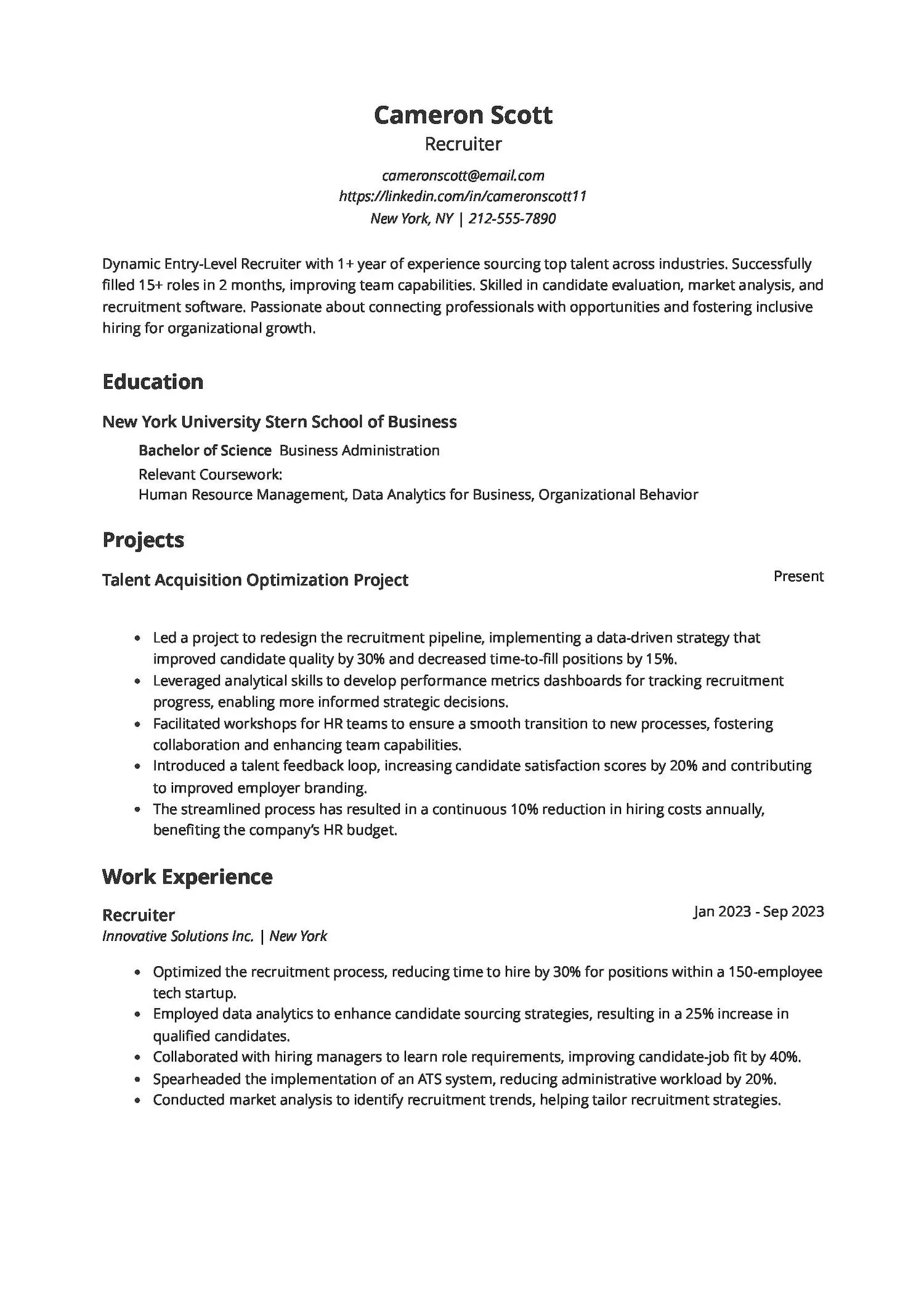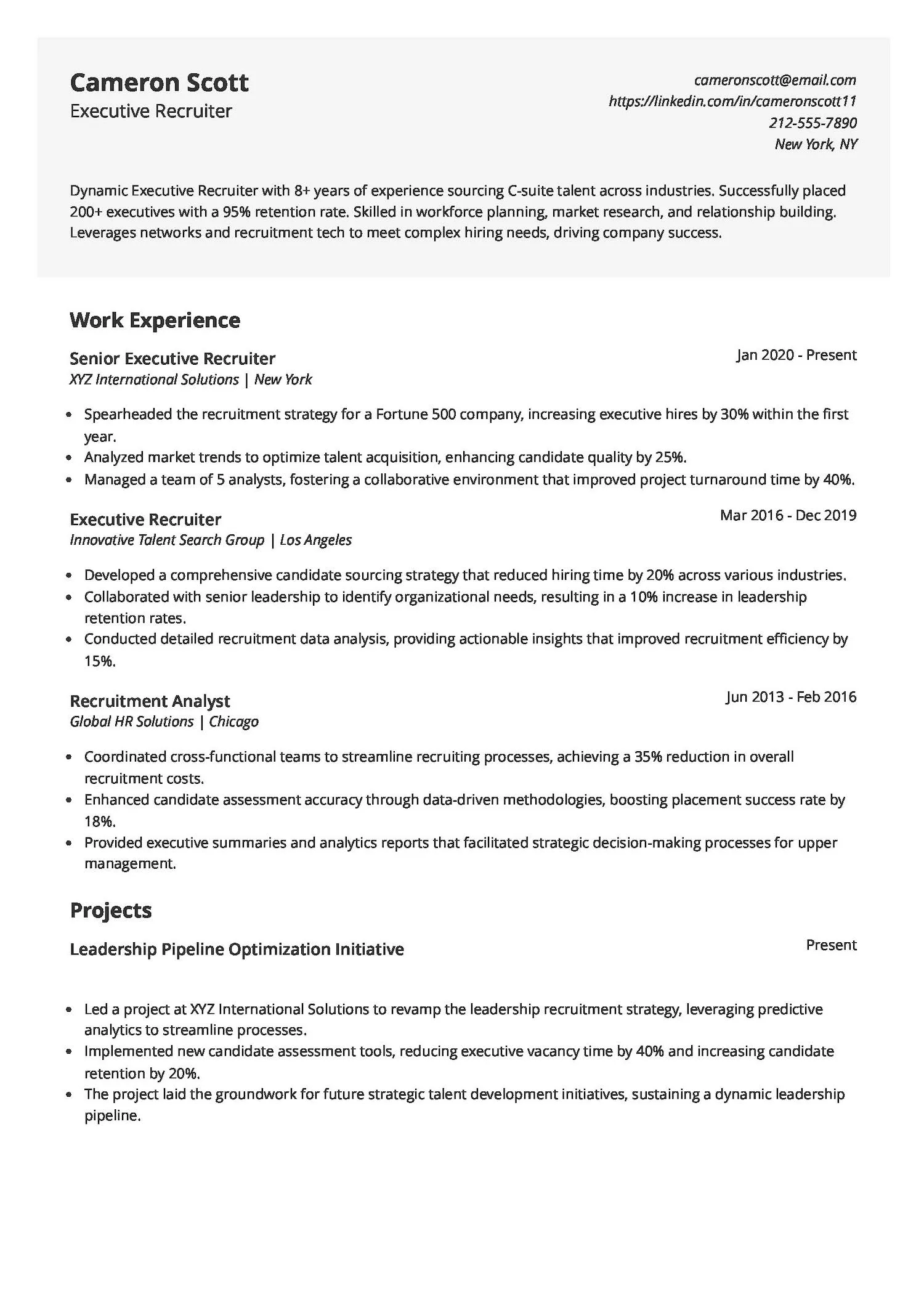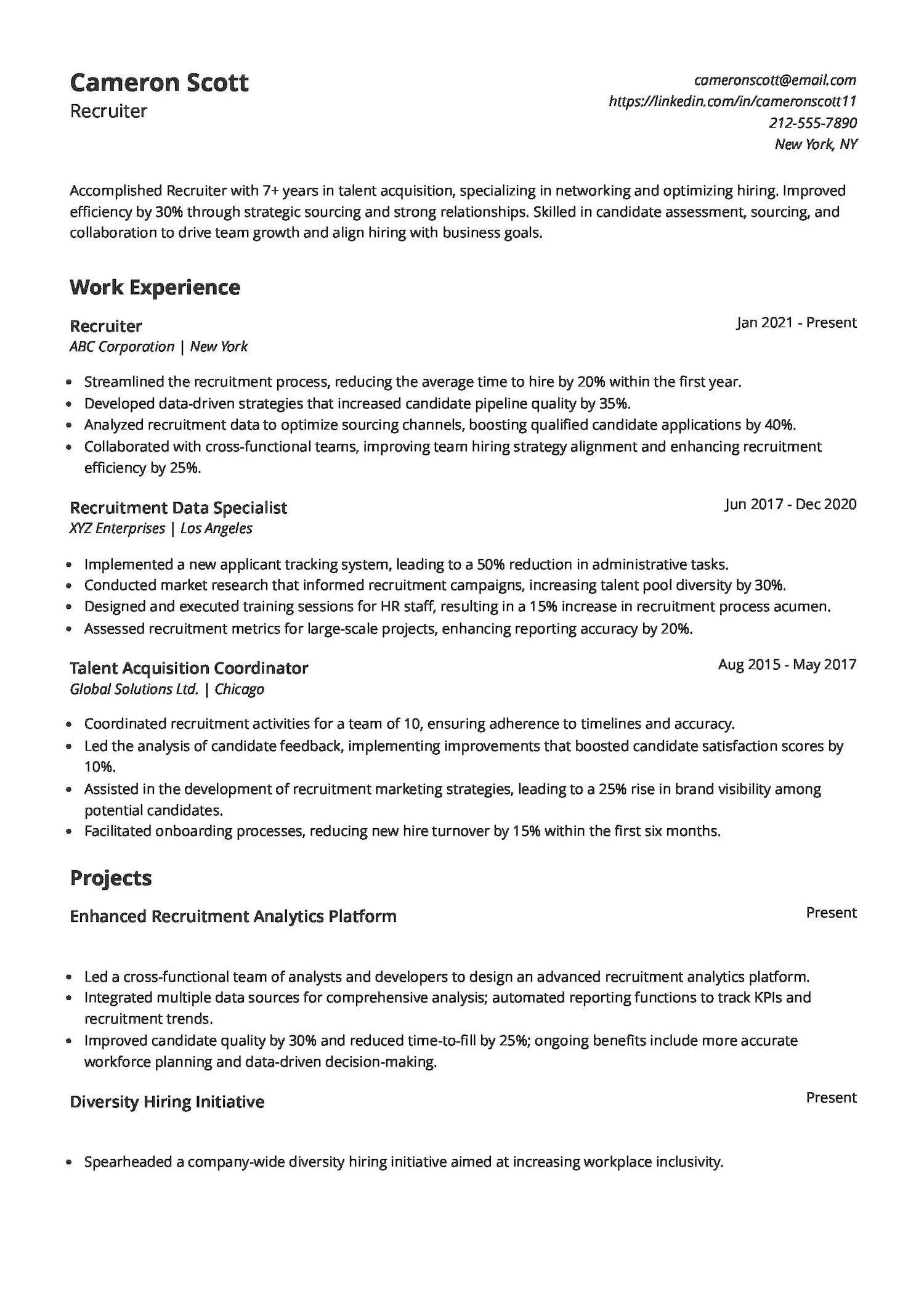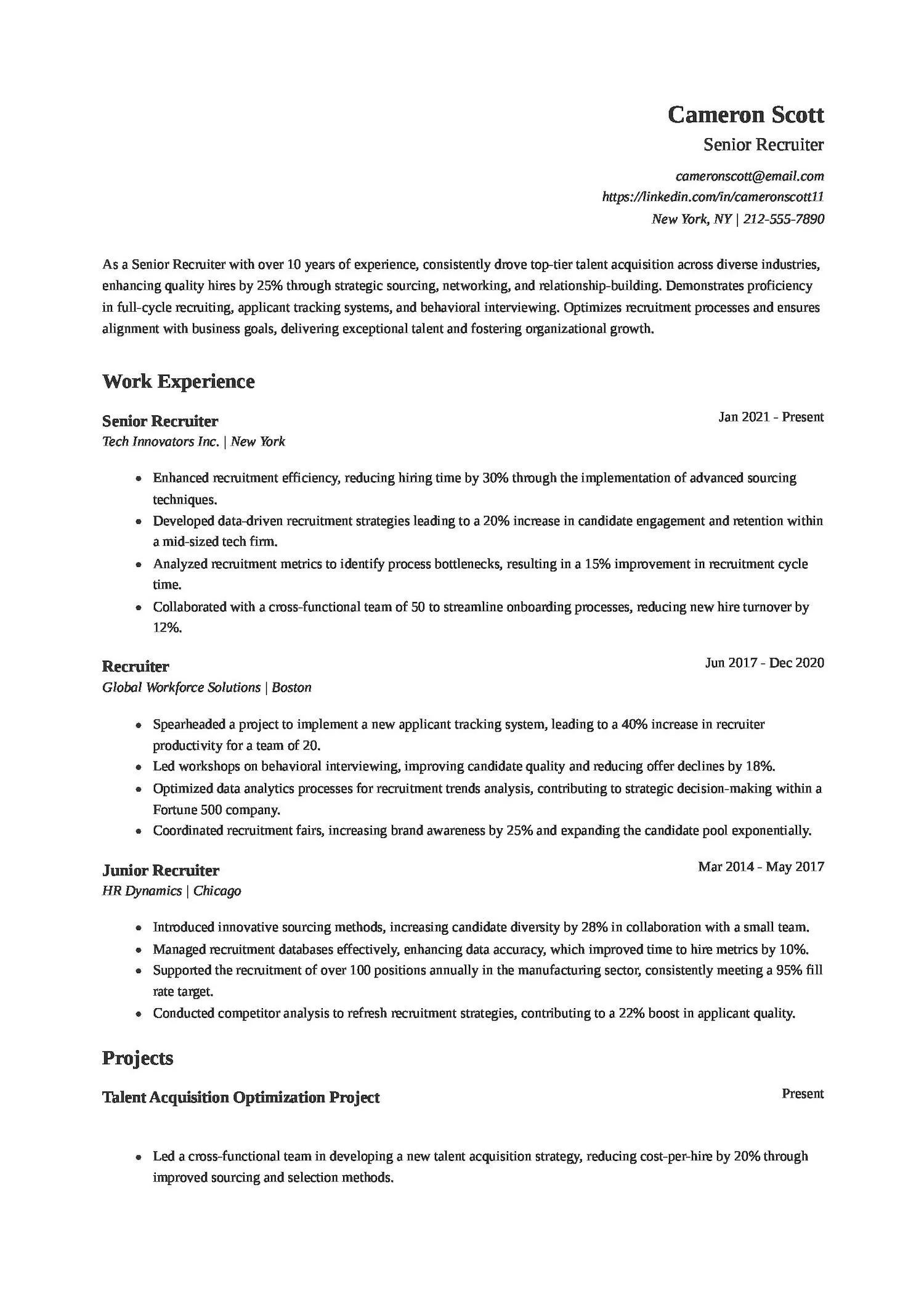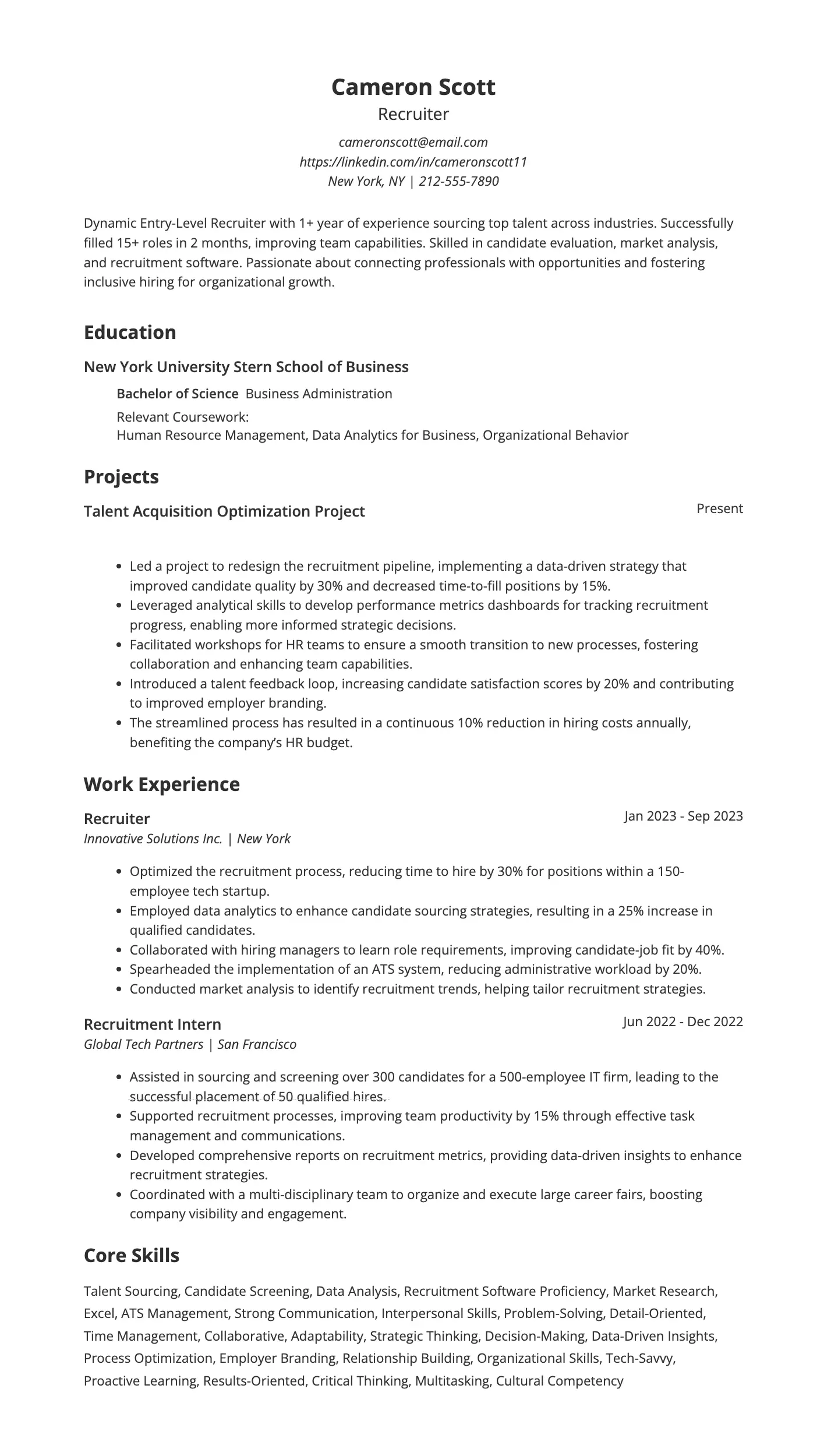Recruiter Resume Examples & Tips for 2025
Find the best recruiter resume examples on our blog to write a compelling application. Get formatting tips, key skills, and expert insights for success.

July 19, 2025

Writing a standout recruiter resume in 2025 requires more than just listing experience—it’s about showcasing your ability to identify top talent, build relationships, and drive hiring success. Whether you’re an experienced recruiter looking to refine your resume or a job seeker transitioning into the field, having a well-structured, compelling resume is key to landing your next opportunity.
In this blog, we’ll provide compelling recruiter resume examples tailored for 2025, along with expert tips to help you highlight your skills, experience, and achievements effectively. By the end, you’ll have a clear roadmap for creating a resume that not only meets industry standards but also grabs the attention of hiring managers and sets you apart from the competition.
Recruiter resume example
Struggling to write a recruiter resume that stands out? Wondering how to showcase your hiring expertise in a way that gets results? Check out this recruiter resume example—it highlights key skills, measurable achievements, and industry expertise to help you land interviews.
Recruiters are expected to source top talent, manage hiring pipelines, and optimize recruitment strategies. Hiring managers look for candidates with strong communication, analytical skills, and ATS proficiency. A well-structured resume that emphasizes impactful results can set you apart.
Hiring managers don’t just scan resumes—they look for impact. This resume makes an immediate impression with a compelling summary that highlights 7+ years of expertise, strategic hiring success, and measurable achievements like a 30% efficiency boost. The education section strengthens credibility, showcasing degrees in HR and Business Administration, backed by high GPAs, relevant coursework, and industry involvement.
With a clean layout, data-driven results, and recognized certifications (CPR, PRC), this resume not only tells a story of success but also proves why the candidate is a top choice in the competitive 2025 job market.
Entry-level recruiter resume example
Breaking into recruiting and not sure how to showcase your experience? Even with limited years in the field, the right resume can highlight your impact, skills, and potential. This entry-level recruiter resume example shows how to emphasize achievements, data-driven results, and core competencies to stand out.
Recruiters need to source, screen, and connect top talent while managing hiring processes efficiently. Employers look for strong communication, data analysis, and adaptability—so a resume that highlights these areas can give you a competitive edge.
Breaking into recruiting requires a mix of skills, experience, and measurable impact, and this resume template delivers on all fronts. The core skills section is well-structured, blending technical expertise (ATS management, data analysis, market research) with soft skills (relationship building, communication, adaptability)—a must for recruiters.
The experience section is tailored for entry-level roles, showing progression from an intern to a recruiter analyst with quantifiable achievements like reducing time-to-hire by 30% and improving candidate-job fit by 40%. This resume not only showcases potential but also proves the candidate is ready to excel in a fast-paced hiring environment.
Senior recruiter resume example
Looking to advance your career as a senior recruiter? Your resume needs to highlight strategic hiring, data-driven decision-making, and leadership in talent acquisition. This senior recruiter resume example showcases expertise in full-cycle recruiting, process optimization, and candidate engagement—exactly what top employers look for.
Senior recruiters are expected to lead hiring strategies, improve recruitment efficiency, and align talent acquisition with business goals. A strong resume should demonstrate measurable impact, leadership skills, and expertise in recruitment technology.
A proven track record of success is what makes this senior recruiter resume stand out. The resume format is structured for impact, showcasing data-driven achievements such as reducing hiring time by 30% and boosting recruiter productivity by 40%. Each role emphasizes human resources management expertise, with quantifiable results in talent acquisition and process optimization.
The resume layout effectively highlights an impressive educational background, including a Master’s from Wharton and top-tier certifications (SPHR, SHRM-CP), reinforcing industry credibility.
Executive recruiter resume example
Willing to advance your career as an executive recruiter? A strong resume should highlight your ability to connect executives with the right opportunities while improving retention and organizational growth. Take inspiration from our executive recruiter resume example, which demonstrates how to showcase key achievements, retention rates, and leadership impact to stand out.
This role requires strategic thinking, deep industry knowledge, and the ability to influence top decision-makers. Employers look for recruiters who can navigate complex hiring needs, leverage market insights, and deliver high-impact talent solutions—making it essential to showcase measurable success and leadership in recruitment.
The strategic project section for this executive recruiter resume showcases high-impact initiatives, such as optimizing leadership pipelines and enhancing diversity hiring, demonstrating measurable success. The core skills section is packed with executive-level expertise, from workforce planning to relationship-building, reinforcing a strong industry presence.
Further, certifications like Certified AI Recruiter and Technical Recruiter Certification (CTRP) add credibility, proving adaptability to modern recruitment trends and cutting-edge hiring technologies.
How to write a recruiter resume that will get you an interview
Ever felt like your resume disappears into a black hole after you hit “submit”? You’re not alone. The reason? Applicant Tracking Systems (ATS).
Think of it like a search engine for resumes where recruiters can enter specific job titles, skills, and keywords to quickly find the best candidates. If your resume doesn’t contain the right keywords or isn’t formatted correctly, it may never even be seen by human eyes. This is why understanding how ATS works can make the difference between your resume landing in a recruiter’s inbox or getting lost in the digital void.
Let’s understand how an ATS works:
- Job posting setup: The employer enters job-related details, such as the title, required skills, and preferred qualifications, into the ATS.
- Resume scanning: The system automatically scans submitted resumes, extracting key information like work history, skills, and education.
- Searchable database: The ATS stores all scanned resumes, allowing recruiters to search by keywords or pull up ranked lists of the most relevant candidates.
If you’re unsure how to tailor your resume for ATS approval, Jobscan can be a game-changer. The free resume builder helps you write an ATS-friendly document that boosts your chances being screened by a human hiring manager.
By using the right tools and strategies, you can ensure that your recruiter resume is ATS-friendly and stands out to hiring managers, securing you that all-important interview!
Optimize your resume for free
Use Jobscan's resume scanner to ensure your recruiter resume is ATS-friendly and includes all the necessary keywords from the job description.
Scan your resume
Key elements of a recruiter resume
The key elements of a recruiter’s resume include:
- Contact information: Include your full name, phone number, professional email address, and LinkedIn profile. Make sure your details are up to date so recruiters can easily reach you.
- Professional summary: A brief, compelling introduction (3–4 sentences) that highlights your recruiting expertise, industry experience, and key accomplishments. This section should immediately capture the potential employer’s attention.
- Core skills: List relevant skills such as talent acquisition, ATS proficiency, candidate sourcing, and employer branding. Incorporating industry-specific keywords helps your resume come up when hiring teams search the ATS.
- Work experience section: Detail your previous recruiting roles in reverse chronological format with bullet points emphasizing achievements, metrics (e.g., number of hires, time-to-fill), and key responsibilities. Use action verbs to make your contributions stand out.
- Education: Mention your degree(s) and relevant coursework if applicable. While a degree in Human Resources, Business, or a related field is often preferred, hands-on experience can be just as valuable.
- Certifications: Certifications such as PHR (Professional in Human Resources), SHRM-CP, or AIRS certification can enhance your credibility and demonstrate your expertise in recruitment best practices.
Write a strong professional summary
The professional summary, positioned at the top of your resume, serves as a concise introduction, highlighting your key qualifications and career aspirations. It’s your opportunity to capture a recruiter’s attention within seconds and demonstrate your immediate value. A compelling summary acts as a strong first impression, enticing the reader to delve deeper into your experience.
Good examples of a resume summary
- “Results-driven recruiter with 5+ years of experience in full-cycle recruiting, talent sourcing, and ATS optimization. Proven ability to reduce time-to-hire by 30% and improve candidate experience. Skilled in leveraging LinkedIn Recruiter, Boolean search, and diversity hiring strategies to attract top talent.”
- “Accomplished Executive Recruiter with 8+ years of experience in C-suite and senior-level talent acquisition. Proven success in headhunting top executives and strengthening leadership pipelines, with a 95% executive retention rate. Skilled in market mapping, leadership assessment, and confidential searches, ensuring a seamless match between high-impact executives and organizational goals.”
Bad examples of a resume summary
- “Hardworking recruiter looking for a job where I can use my skills. Passionate about HR and helping people find jobs. Experienced in hiring and recruiting.”
- “I am a recruiter looking for a job where I can help hire people. I have some experience in hiring and am good at talking to candidates.”
Need help writing a compelling summary? Jobscan’s Resume Summary Generator can help! It provides personalized, ATS-friendly summaries based on your professional experience and the job description—ensuring your resume gets noticed.
Demonstrate key recruiter skills
To stand out as a recruiter, your resume must showcase the right mix of hard and soft skills. Hiring managers and ATS systems scan for these skills to determine if you’re the right fit.
Hard skills for recruiter
- Applicant Tracking Systems (ATS) (e.g., Greenhouse, Workday)
- Boolean Search & Sourcing Strategies
- Full-Cycle Recruiting (Sourcing, Screening, Interviewing, Negotiation)
- Diversity & Inclusion Hiring Strategies
- Data-Driven Hiring & Recruitment Metrics
- Employer Branding & Talent Marketing
- Compensation & Offer Negotiation
Soft skills for recruiter
- Strong Communication & Negotiation
- Relationship Management & Candidate Engagement
- Problem-Solving & Critical Thinking
- Adaptability in Fast-Paced Environments
- Time Management & Organization
- Emotional Intelligence & Active Listening
- Collaboration & Stakeholder Management
Highlighting essential recruiting skills in your resume bullet points allows you to showcase your expertise and accomplishments effectively. Below are examples of good and bad recruiter resume bullet points to guide you.
Write impactful resume bullet points for a recruiter
Resume bullet points are the core of your experience section. They should clearly communicate your skills, the impact you’ve made, and the value you bring to a team. Instead of listing tasks, focus on what you accomplished using specific tools, action verbs, and measurable results. Here’s what that looks like:
Good examples of resume bullet points
- “Implemented a new ATS strategy, improving candidate pipeline efficiency by 40%.”
- “Reduced time-to-hire by 25% by optimizing sourcing techniques and streamlining interview processes.”
- “Developed and led a diversity hiring initiative, increasing underrepresented hires by 15%.”
Bad examples of resume bullet points
- “Hired people for different roles.”
- “Worked with hiring managers to fill positions.”
- “Used ATS to track candidates.”
Struggling to write strong bullet points? We get it—writing impactful resume bullet points is tough. Use Jobscan to transform your resume and land more interviews. Our Bullet Point Generator takes your experience and turns it into powerful, ATS-friendly achievements that highlight your skills and impact. Try it today!
Highlight your achievements as a recruiter
Recruiters don’t just fill positions—they drive business success by finding top talent. That’s why highlighting your impact and achievements is just as important as listing your responsibilities. Instead of simply stating what you did, show how well you did it with measurable results.
How to highlight your achievements? Here are some examples:
- Use numbers and metrics: Hiring managers love quantifiable results. Instead of “managed recruitment for a company,” say: “Reduced time-to-hire by 30% by optimizing sourcing strategies.”
- Showcase impact: Explain how your work benefited the company. Example: “Helped scale a startup from 10 to 150 employees in 18 months.”
- Use action verbs: Start bullet points with strong verbs like sourced, optimized, streamlined, developed, implemented, built, led, etc.
- Highlight special initiatives: If you worked on projects, showcase your role and results.
Tailor your resume to the job description
In the competitive field of recruitment, a generic resume simply won’t cut it. To truly stand out, you must meticulously tailor your resume to each specific job description. This isn’t just about changing a few keywords; it’s about demonstrating that you possess the precise skills and experience the employer is seeking.
Follow the steps below to tailor your resume effectively:
- Analyze the job description: Carefully read the job description, identifying key responsibilities, required skills, and desired qualifications. Pay close attention to the specific language used.
- Identify keywords: Extract relevant keywords and phrases from the job description. These may include specific recruiting methodologies (e.g., Boolean search, passive sourcing), industry-specific knowledge, software proficiencies (e.g., ATS, CRM), or soft skills (e.g., communication, negotiation).
- Incorporate keywords strategically: Integrate these keywords naturally throughout your resume, particularly in your professional summary, skills section, and experience bullet points. Avoid keyword stuffing, which can be detrimental.
- Highlight relevant experience: Focus on your experiences that directly align with the responsibilities and requirements outlined in the job description. Quantify your achievements whenever possible, using metrics and data to demonstrate your impact.
- Match the tone and language: Mirror the tone and language used in the job description. If the company emphasizes a collaborative environment, highlight your teamwork skills. If they value data-driven recruiting, showcase your analytical abilities.
- Customize your skills section: Prioritize the skills mentioned in the job description and ensure they are prominently displayed in your skills section.
- Refine your professional summary: Tailor your professional summary to reflect the specific requirements of the role, highlighting your most relevant qualifications and achievements.
- Review and refine: Before submitting your resume, carefully review it to ensure it aligns perfectly with the job description.
7. Include relevant education & certifications
Your educational background and professional certifications can significantly enhance your credibility and demonstrate your commitment to continuous learning. Including relevant certifications and education is crucial for showcasing your expertise and setting yourself apart from other candidates.
Here’s how you can add education and certifications:
- List your highest degree first.
- Include your degree name, university, and graduation year.
- Mention courses related to talent acquisition, HR analytics, or organizational behavior (if applicable).
- Place your certifications under education or in a separate “Certifications” section.
- Add industry-recognized certifications to boost credibility.
- Highlight certifications that demonstrate expertise in executive search, AI recruitment, or technical hiring.
Top recruiter certifications
- Professional in Human Resources (PHR)
- Senior Professional in Human Resources (SPHR)
- SHRM Certified Professional (SHRM-CP)
- SHRM Senior Certified Professional (SHRM-SCP)
- Certified Internet Recruiter (CIR)
Recruiter resume tips for a standout application
To make your recruiter resume truly shine, go beyond the basics. Here’s how to create a standout application that captures attention:
- Quantify your impact: Don’t just list duties; showcase results. Use numbers to demonstrate your effectiveness.
- Highlight sourcing expertise: Emphasize your proficiency in various sourcing methods.
- Showcase candidate management skills: Demonstrate your ability to build strong relationships with candidates and provide a positive experience.
- Emphasize hiring manager collaboration: Highlight your ability to partner with hiring managers to understand their needs and deliver qualified candidates.
- Demonstrate knowledge of employment law: Show that you understand relevant employment laws and regulations, such as EEO and ADA.
- Clean and professional formatting: Employ a clear, easy-to-read font, maintain consistent formatting, and utilize white space effectively to enhance resume readability.
- Concise and focused content: Keep your resume to one or two pages and use bullet points to highlight key achievements. Also, avoid jargon or technical terms that the recruiter may not understand.
- File format: Save your resume as a PDF unless otherwise specified.
Include a cover letter with your recruiter resume
It’s a common question: “Do I really need a recruiter cover letter?” The answer is yes. Even in today’s recruiting landscape, a compelling cover letter allows you to highlight your passion, inject your personality, and clearly demonstrate how you can contribute to a company’s success.
Points to remember:
- Personalize it: Address the hiring manager by name and tailor the letter to the specific job and company.
- Start strong: Open with a compelling statement that highlights your enthusiasm and key qualifications.
- Showcase achievements: Focus on measurable successes and skills relevant to the role.
- Keep it concise: Limit to one page with clear, impactful language.
- End with a call to action: Express interest in an interview and thank the reader for their time.
- Proofread carefully: Check for typos, grammar errors, and formatting consistency.
However, many job seekers struggle with what to say, how to format it, and how to make a cover letter engaging. If you’ve ever stared at a blank page, unsure how to start, try Jobscan’s Cover Letter Generator. With AI-powered suggestions, you get a tailored, professional, and ATS-friendly cover letter in minutes—without the frustration!
Final thoughts
As we look toward 2025, the recruiter industry is evolving rapidly. Staying ahead means embracing data-driven results, showcasing your tech proficiency, and demonstrating a deep understanding of the modern talent landscape in the resume.
Remember, ATS optimization matters—and tools like Jobscan can help you write an ATS-friendly, high-impact resume that gets past filters and in front of hiring managers. Whether you’re a seasoned recruiter or breaking into the field, take inspiration from the resume examples in this blog and write an application that will set you apart in the competitive hiring landscape.

Recruiter common interview questions
Can you walk us through your recruitment process?
Answer:
“I start by meeting with the hiring manager to understand the job requirements, team dynamics, and must-have skills. Then, I develop a sourcing strategy using LinkedIn Recruiter, Boolean searches, and job boards. I screen candidates through structured interviews, assessing both technical skills and cultural fit. After coordinating interviews with the hiring team, I guide candidates through the offer process, ensuring a smooth and positive experience.”
How do you source passive candidates?
Answer:
“I use a mix of LinkedIn Recruiter, Boolean search, GitHub (for tech roles), and niche job boards. I also leverage employee referrals and network at industry events. When reaching out, I personalize my messages by referencing their work or shared connections, which increases response rates. A strong employer brand and engaging content on LinkedIn also help attract passive talent.”
What strategies do you use to improve diversity hiring?
Answer:
“I partner with diverse professional organizations, source from underrepresented talent pools, and use bias-free job descriptions. I also collaborate with hiring managers to set diversity goals and ensure a fair interview process. Additionally, I use structured interviews and anonymized resume screening to minimize bias.”
How do you handle difficult hiring managers?
Answer:
“I build relationships with hiring managers by understanding their challenges and setting clear expectations upfront. If they have unrealistic demands, I use market data to educate them on talent availability. If they delay the process, I communicate the risks of losing top candidates and suggest ways to streamline hiring decisions.”
How do you handle a rejected job offer?
Answer:
“I always ask for feedback to understand why the offer was declined. If compensation was the issue, I try to negotiate within budget constraints. If it’s about company fit, I explore other potential roles. Keeping a strong relationship with candidates ensures they consider us for future opportunities.”
Recruiter resume frequently asked questions
What are the most important recruiter skills to highlight on a resume?
A strong recruiter resume highlights hard skills like ATS proficiency, Boolean search, and full-cycle recruiting, along with soft skills such as communication, negotiation, and adaptability. Tailor your skills to the job description for maximum impact.
How do I include my education experience in a recruiter resume?
List your degree, university name, and graduation year under an “Education” section. If you have relevant coursework in HR, include it. Certifications like SHRM-CP, or LinkedIn Recruiting Certifications can be added to boost credibility. If you’re a recent graduate, highlight internships or HR-related projects to showcase practical experience.
How should I write a resume if I have no experience as a recruiter?
If you’re new to recruiting, highlight transferable skills from sales, customer service, HR, or admin roles—focusing on communication, relationship-building, and problem-solving. Use an objective statement to express your passion and emphasize certifications, internships, or coursework. Showcase strong achievements to bridge the experience gap.
